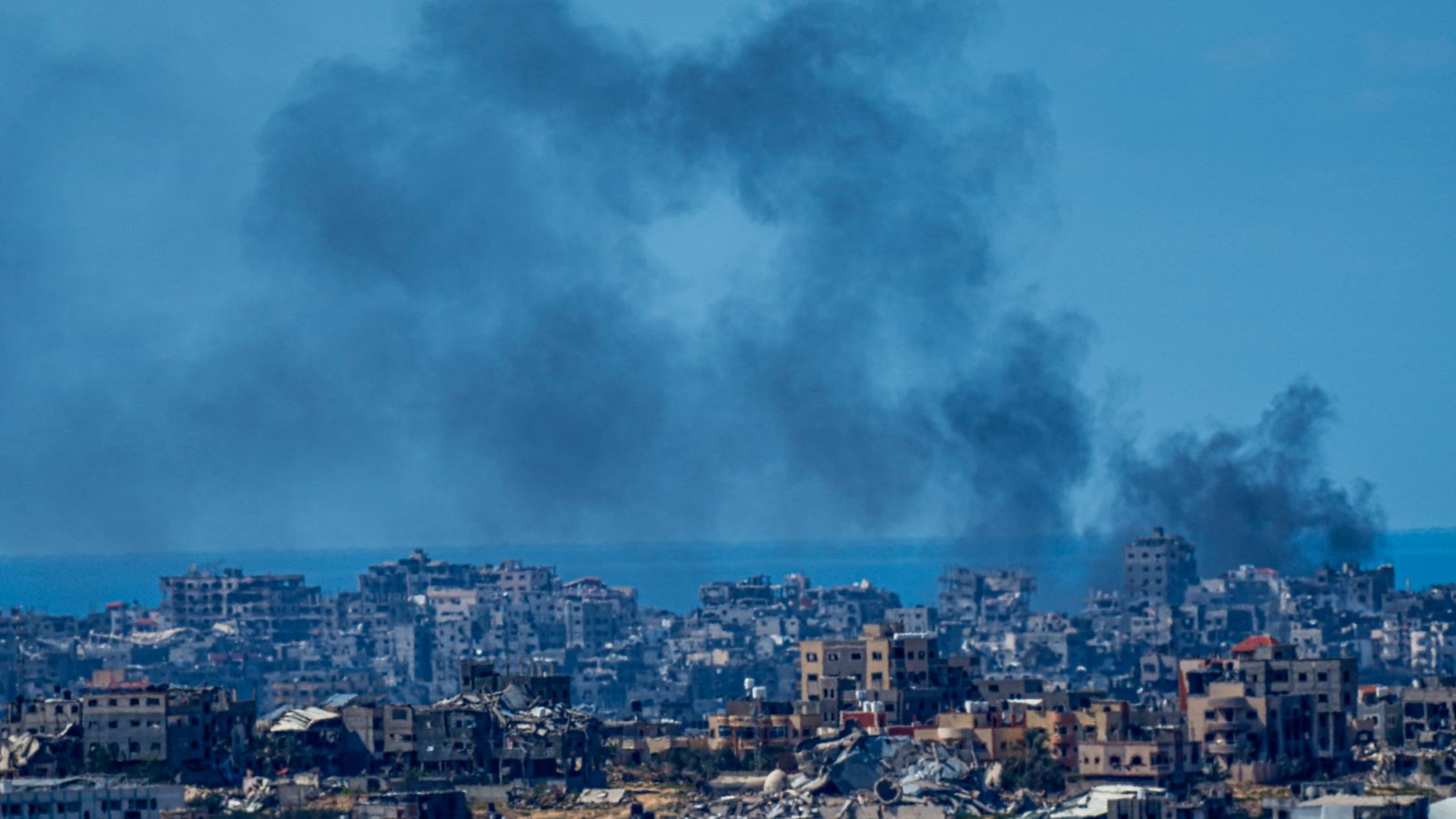Hamas is “concerned” about reports that one of its top commanders was killed in a weekend air strike in Gaza, according to Israeli media.
Maariv, a Hebrew language newspaper, was among those to report the reaction from Palestinian sources following speculation about Marwan Issa’s fate.
Issa, a deputy commander of Hamas’s military wing and known as “shadow man” for his ability to evade Israeli forces, was reportedly hiding underground in central Gaza during Saturday night’s airstrike.
Middle East latest: Israel ‘checking’ if senior Hamas leader was killed in strike
He is thought to be one of those behind Hamas’s 7 October attacks, in which 1,200 people were killed and more than 250 abducted – the opening salvo in a war that is now in its sixth month.
Sky’s Middle East correspondent Alistair Bunkall said: “If Issa is confirmed dead, he will be the highest-ranking Hamas leader killed in the war so far and it will represent a significant success for Israel.”
Israel’s military said on Monday that it is still trying to confirm whether Issa was among five Palestinians killed in the strike.
Jerusalem Muslims were promised freedom to worship this Ramadan – I watched them being turned away
Three Palestinians arrested on terrorism charges by Italian police
The Week… The government decides who is an extremist
Military spokesperson Rear Admiral Daniel Hagari said Issa was known to use the underground compound, but its location made confirming the identities of the dead more complicated.
“We are still examining the results of the attack and we have yet to get final confirmation,” he said.
Meanwhile, hopes of a ceasefire to coincide with the beginning of Ramadan, the Muslim holy month which began today, have been dashed.
The US, Qatar and Egypt had aimed to broker a truce, to include the release of dozens of Israeli hostages and Palestinian prisoners and the entry of much-needed humanitarian aid, but talks in Cairo stalled last week.
So, as hundreds of thousands in Gaza teeter on the brink of starvation, with aid deliveries few and far between, the joyful holiday feasts that usually break the daily fasting will be bleak affairs.
More than 30,000 Palestinians have died in the war, according to the Hamas-run Gaza health ministry, and some 80% of Gaza’s 2.3 million people have been driven from their homes.
Israel’s defence minister had said that if Hamas did not release Israeli hostages by Ramadan, troops would move into Rafah, in the south of the Gaza Strip.
Read more:
I watched Muslims being turned away from al Aqsa Mosque
Biden’s criticism of Netanyahu in danger of ringing hollow
On board Jordan’s flight airdropping aid to desperate Gazans
But Sky’s military analyst Michael Clarke said the Israeli Army “are not ready to go into Rafah”, having sent many of their reserve troops home to save an economy struggling with the absence of so many people.
“They’ve only got between a third and half of the troops in Gaza in total compared to those they started with and if they want to move into Rafah we’ll see it developing, we’ll see them positioning themselves for it and they’re not doing that at the moment.”
This would not stop Israel from bombing targets in Rafah, he said, but overall the stalemate left their strategy unclear.
“To be honest, I think it has become militarily incoherent now. It’s difficult to see what the Israeli strategy is – are they going to pause? Are they going to move in after Ramadan? Are they going to bomb during Ramadan?
“None of their objectives will be achieved in the short term, certainly, and here we are, six months in.
“The Americans originally said ‘we’ll give you until January to get this finished’ and here we are in March. It’ll go into April, it’ll go into May and they’ll still be chasing Hamas leaders in Rafah.”
Also on Monday, the wife of Israeli prime minister Benjamin Netanyahu, Sara, sent a letter to the mother of Qatar’s emir pleading for her help in getting the more than 130 remaining Israeli hostages released.
In her letter, Mrs Netanyahu, 65, told Sheikha Moza bint Nasser al Missned that Ramadan was “a time for compassion and generosity”, adding: “Woman to woman, it’s imperative to address that among the hostages, 19 women are enduring unimaginable hardships.
“Reports of sexual abuse and rape are horrifying and such acts against women cannot be ignored or tolerated.”
She added: “Your involvement could be instrumental in bringing them home, offering a beacon of hope to their families, and taking a significant step toward peace and reconciliation.”
Sheikha Moza bint Nasser al Missned is seen as one of the most powerful figures in the wealthy kingdom but Qatar does not formally recognise Israel and also has ties with its arch-enemy Iran.
Sky News has sought a response from her office.




